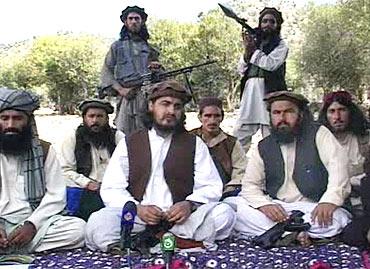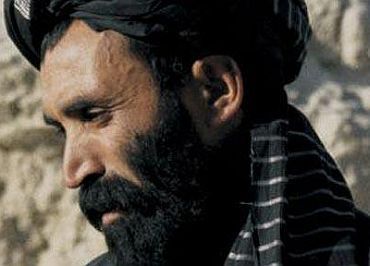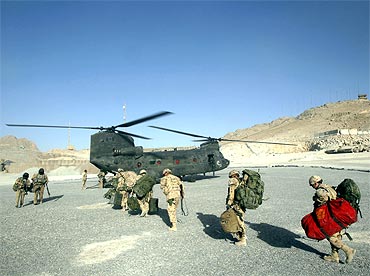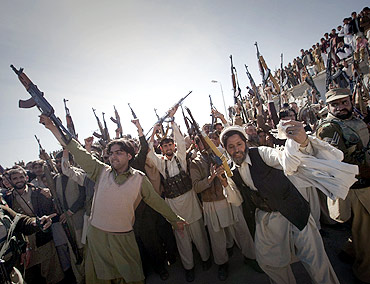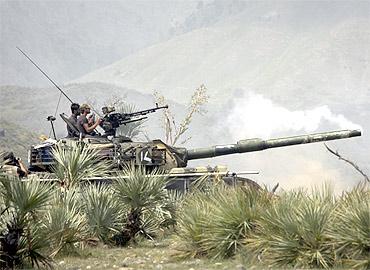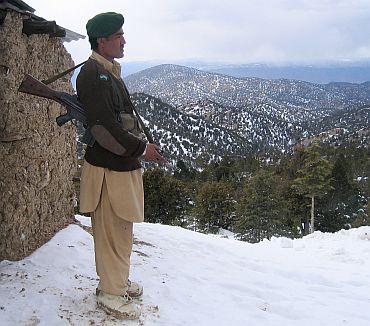 | « Back to article | Print this article |
Why Pak Taliban rejected Islamabad's offer of peace talks
The offer of peace talks came at a time when the Pakistani military operations in the Federally Administered Tribal Areas on the Pak-Afghan border had had little impact on the operational capabilities of the Tehrik-e-Taliban. Amir Mir reports.
Reiterating his pledge of loyalty to the fugitive Afghan Taliban, Mullah Mohammad Omar, the elusive chief of the Tehrik-e-Taliban Pakistan Commander Hakimullah Mehsud has rejected the Pakistan government's most recent offer of peace talks by vowing to carry out more terrorist attacks on the state of Pakistan.
The fresh offer was made by Pakistan's Interior Minister Rehman Malik in a special Eid message that was released on November 6 on the eve of the Islamic festival, calling upon the Pakistani Taliban and all other militants to shed their weapons and become part of the national mainstream.
However, while vigorously rejecting the offer of peace talks on the Eid day on November 7, the TTP chief Hakimullah Mehsud declared that the war with the state of Pakistan will continue primarily because it is siding with "the forces of the infidel".
Click NEXT to read further...
'I urge Muslims to rise against agents of the infidels'
In his special Eid day message released by the SITE Intelligence Group, Hakimullah accused the Pakistani military and the state of handing over Arab, Uzbek, and other Mujahideen to the kuffar (unbeliever of infidel) only to please their leaders.
The Arabs to whom the TTP chief has referred are in fact members of Al Qaeda while the Uzbeks are members of the Islamic Movement of Uzbekistan (IMU) and other affiliated groups. "Our war with you will continue and soon you will be humiliated and disgraced in this very life, and kuffar too will turn its back on you. For they (kuffar) have used you and can no longer see any strength remaining in you."
While blaming the oppression and injustices committed against the militants by selfish rulers whose loyalties lie with the Jews and the Christians, the TTP chief said uniting under the leadership of Mullah Mohammad Omar and waging jehad was the solution.
"I urge all Muslims to rise up against these agents of the kuffar (infidels) who have sold their consciences; to rise above their differences and unite under the banner of Ameer-ul-Momineen Mullah Mohammad Omar and work towards the revival of the Caliphate - a dream awaiting fulfillment," Hakimullah said in his message.
Click NEXT to read further...
'We do not accept the divisions of the Durand Line or any borders'
Hakimullah also rejected the Durand Line, the border that divides Afghanistan and Pakistan, and said the bond with the Afghan Taliban will continue to strengthen. "There is no doubt that the Muslim Ummah (Mulsim community) is one body, and as Muslims we do not accept the divisions of the Durand Line or any borders," Hakimullah said.
"We are all loyal soldiers of Ameer-ul-Momineen Mullah Mohammad Omar. He is our leader, guide and ameer. The services and sacrifices made by Tehrik-e-Taliban Pakistan for the Islamic Emirate of Afghanistan have been proven over time and our association with them will only continue to strengthen."
Hakimullah Mehsud urged Muslims to "display utmost unity" as the United States and the NATO forces prepare to withdraw from Afghanistan. "The armies of the kuffar (infidel) are well on their way to defeat, and as an exit strategy will make last ditch efforts to create rifts amongst the ummah (Mulsim community)", Hakimullah added.
Click NEXT to read further...
Quantum leap in Tehrik-e-Taliban's organisational strength
The latest offer of peace talks with the Taliban came at a time when the Pakistani military operations in the Federally Administered Tribal Areas (FATA) on the Pak-Afghan border have had little impact on the operational capabilities of the Tehrik-e-Taliban, which is stepping up its terror activities across Pakistan. There are reports that the organisational strength and growth of the TTP has taken a quantum leap over the past years, both qualitatively and quantitatively.
While there are those in the Pakistani establishment who believe that the TTP has rejected the government's offer of peace talks while taking it as a sign of weakness, others say the TTP was bound to reject Islamabad's peace initiative because its leadership no more trusts the Pakistani establishment.
The Pakistani Taliban are clearly in no mood to hold peace talks with Islamabad despite Army Chief General Ashfaq Kayani's October 18 statement that the Army won't have any objection over the government in Islamabad having dialogues with the Taliban.
General Kayani had actually endorsed Pakistani Prime Minister Yousuf Raza Gilani's October 2 statement that his government was ready to hold negotiations with all militant groups, including the Tehrik-e-Taliban Pakistan.
Reacting to the peace offer on October 3, Maulvi Faqeer Mohammad, the deputy commander of TTP, welcomed the Prime Minister's offer but not without setting out two unattainable preconditions for talks: one, the government should reconsider its relationship with the United States; and, two, enforce Islamic Shariah in the country.
Click NEXT to read further...
TTP sets out unrealisable preconditions for talks
Obviously, it was hard for the prime minister to accept these preconditions, especially when Pakistan is already under tremendous pressure to launch a military offensive against the Haqqani militant network in the North Waziristan tribal agency.
Even otherwise, influential diplomatic circles in Islamabad argue that the Pakistan government simply can't hold peace talks with a militant group which has already been placed on the international anti-terrorism sanctions list of the United Nations Security Council. Before tagging the Tehrik-e-Taliban Pakistan as a terrorist organisation on July 29, the UNSC had already included Hakimullah Mehsud and his second-in-command, Waliur Rehman, in its sanctions list in October 2010.
Strangely enough, the UNSC sanctions on the Tehrik-e-Taliban Pakistan came four years after the group emerged along the rugged border areas with Afghanistan and declared an open war against the Pakistani state and its security establishment for siding with the forces of the infidel.
The TTP is an umbrella organisation of various small and big Islamic militant groups based in the Federally Administered Tribal Areas of Pakistan along the Afghan border in Pakistan. It was formed in North Waziristan on December 12, 2007 when an assembly of 40 senior Pakistani jehadi leaders commanding a pooled force of about 40,000 gathered in Peshawar, the capital of Khyber Pakhtunkhawa Province and decided to come together under a single banner, Tehrik-e-Taliban Pakistan, led by Commander Baitullah Mehsud, who was eventually killed in a US drone attack in August 2009.
Click NEXT to read further...
Experts fear peace talk would erode authority of Pakistan
The stated objectives of TTP at the time of its launching were to unite the Pakistani Taliban and set up a centralised organisation against the NATO forces in Afghanistan, besides waging a defensive jehad against the Pakistani security forces.
Since Baitullah's death and the elevation of Hakimullah Mehsud as the new TTP chief, there is an unprecedented rise in TTP-sponsored terrorist activities in almost every nook and cranny of Pakistan. This is mainly because the TTP has combined forces in recent years with Al Qaeda and some other terrorist organisations, threatening to extend their reach and ambitions.
Although unending American drone strikes in the tribal areas of Pakistan have greatly affected the TTP's capabilities, the Al Qaeda-linked jehadi group has clearly sustained itself through alliances with other jehadi groups, splinter cells, foot soldiers and guns-for-hire in the tribal belt.
However, instead of launching a full-scale military offensive in North Waziristan to dismantle the vast jehadi infrastructure of the TTP, the Pakistani establishment is offering peace talks to the Taliban and other such militant groups, amidst fears being expressed by international terrorism experts that such unwise moves are bound lead to another fiasco besides further eroding the authority of the state of Pakistan.
